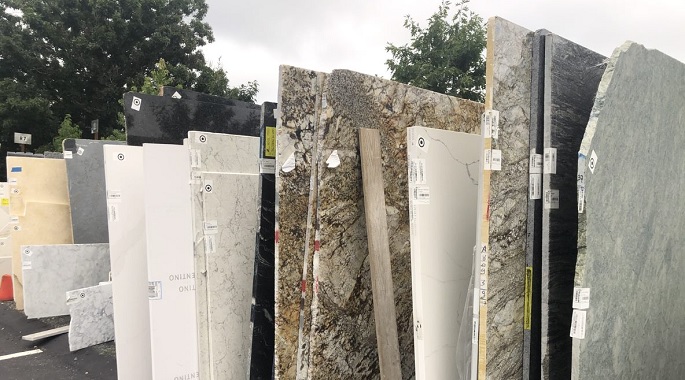When in the market for new kitchen countertops, a backsplash, bathroom surround or fireplace surround, you may be wondering which type of stone to go with: natural stone or engineered stone. The one you choose will depend on your budget and aesthetic preferences, but we have compiled these pros and cons to help you decide. Natural Stone vs. Engineered Stone for Massachusetts homeowners
Natural Stone
Natural stones include granite, marble, soapstone, limestone, and more.
Pros of Natural Stone
- Each natural stone is a work of art, offering a unique beauty that ensures no two pieces are the same. They come from quarries around the world, where they are mined and cut into slabs. It’s possible to choose the country and region you want your countertop materials to come from.
- Natural stones form naturally, as you would guess. That means these stones are constantly evolving, plus they’re plentiful and are considered a sustainable resource. They are made up of one pure ingredient, which reduces the environmental footprint and ensures recyclability.
- Due to their porosity, the natural stones you purchase for your countertops will usually be pre-treated with a sealant. All you have to do in terms of maintenance is wipe up any spills immediately and reapply the sealant every year. Natural stone should last a lifetime with the proper care.
- If you plan to sell your home in the near future, keep in mind that natural stone has a higher resale value than its engineered counterpart.
Cons of Natural Stone
- Natural stones are very heavy, which means before installation, you may have to structurally reinforce your cabinets and floors.
- The sample you may choose in the showroom isn’t always the exact piece you will get. Veining, color and brightness all vary from one slab to another.
- Natural stone may be more costly than engineered stone, depending on its origin and rarity.
Engineered Stone
This type of stone includes quartz, silestone, etc.
Pros of Engineered Stone
- There are no surprises with engineered stone. You get exactly what you see in the showroom.
- Engineered stone is priced in the mid-range area, lower than that of high-end natural stone.
- You don’t need to seal engineered stone due to its composition of crushed natural stone and polymer resin.
- You have unlimited options in terms of colors, patterns and styles, as new engineered stones are constantly being developed.
Cons of Engineered Stone
- Resins in engineered stones may swell or contract with extreme or sudden temperature changes. While it is heat-resistant, you should always protect the surface with a cloth or trivet before setting down a hot pan.
- Engineered stone may have an unnatural appearance because sometimes the uniformity and coloring is too perfect.
- Chips and scratches can be difficult to repair. In addition, seams appear more noticeable.
Your personal preferences, lifestyle and budget will make all the difference in deciding between natural and engineered stone countertops.
Contact Granite Guy
If you need more advice on choosing between natural stone and engineered stone for your countertops, contact us at 508-460-7900 and speak with one of our Southborough stone installers.

